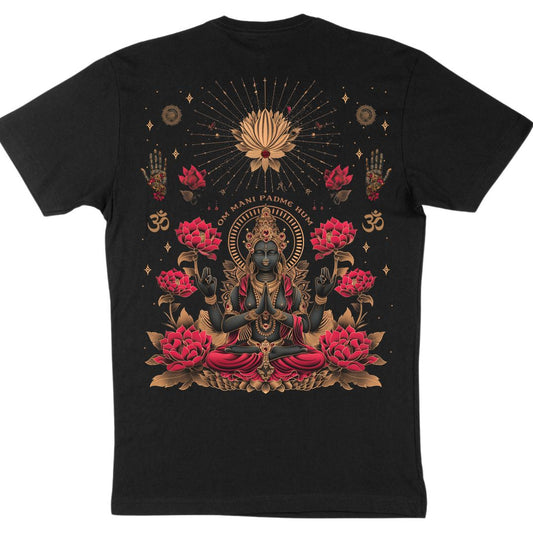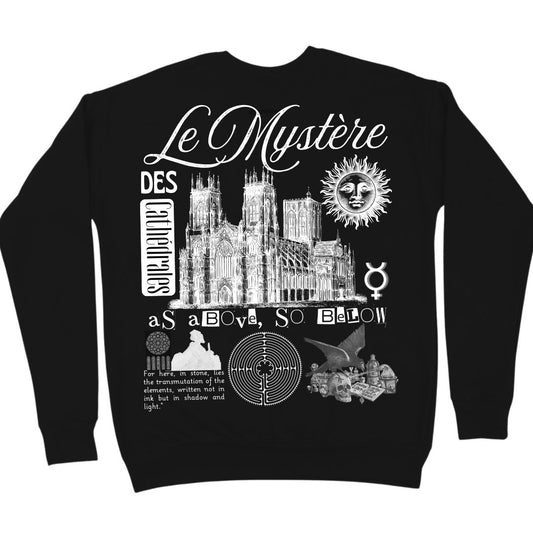-
Ace of Cups Research Support | Tarot Consciousness Studies
Regular price $30.00 USDRegular priceUnit price / per$36.00 USDSale price $30.00 USDSale -
Alchemical Dragon Tshirt
Regular price $30.00 USDRegular priceUnit price / per$36.00 USDSale price $30.00 USDSale -
Alchemical Process Research Support | Sacred Transformation Studies
Regular price $30.00 USDRegular priceUnit price / per$36.00 USDSale price $30.00 USDSale -
Archai Research Support | Time Spirits & Spiritual Hierarchy Studies
Regular price $34.00 USDRegular priceUnit price / per$41.00 USDSale price $34.00 USDSale -
Chenrezig Buddhist Consciousness Research Support | Compassion Studies
Regular price $34.00 USDRegular priceUnit price / per$41.00 USDSale price $34.00 USDSale -
 Sale
SaleConquer Death Tshirt
Regular price $34.00 USDRegular priceUnit price / per$41.00 USDSale price $34.00 USDSale -
Eternal Being | Esoteric Apparel | Embroidered Soft Sweatshirt
Regular price $60.00 USDRegular priceUnit price / per$72.00 USDSale price $60.00 USDSale -
 Sale
SaleForever YHWH T-shirt
Regular price $34.00 USDRegular priceUnit price / per$41.00 USDSale price $34.00 USDSale -
Four Sights of the Buddha Sweatshirt | Premium Soft Sweatshirt
Regular price $60.00 USDRegular priceUnit price / per$72.00 USDSale price $60.00 USDSale -
Goethe Quote Sweatshirt
Regular price $64.00 USDRegular priceUnit price / per$77.00 USDSale price $64.00 USDSale -
Hermetic Consciousness Research Support | As Above So Below Studies
Regular price $30.00 USDRegular priceUnit price / per$36.00 USDSale price $30.00 USDSale -
Hermetic Principles Research Support | Sacred Wisdom Studies
Regular price $57.00 USDRegular priceUnit price / per$68.00 USDSale price $57.00 USDSale -
Incarnations of Rudolf Steiner Sweatshirt
Regular price $60.00 USDRegular priceUnit price / per$72.00 USDSale price $60.00 USDSale -
Le Mystère des Cathédrales Sweatshirt
Regular price $64.00 USDRegular priceUnit price / per$77.00 USDSale price $64.00 USDSale -
Norse Mythology Yggdrasil Tshirt
Regular price $34.00 USDRegular priceUnit price / per$41.00 USDSale price $34.00 USDSale -
Plant Life Cycle Sweatshirt | Premium soft sweatshirt
Regular price $60.00 USDRegular priceUnit price / per$72.00 USDSale price $60.00 USDSale
Collection: Support Sacred Symbolism Research...
Sacred Symbolism Clothes: Garments of Glory
From the temple garments of ancient traditions to the white robes of ritual purity, our collection honors the rich tapestry of religious symbolism. Each piece embodies the spirit of sacred ceremonies and rituals found in traditions like Hinduism, Buddhism, and Esoteric Christianity.
Sacred: Vestments for the Modern Seeker
Temple Clothing Collection
Our temple clothing draws inspiration from holy places of worship across traditions like Taoism and Hermetic traditions. Each garment incorporates elements from various spiritual practices, celebrating the universal quest for divine wisdom.
Ceremonial Attire
Experience the glory of sacred space through our sacred symbolism collection. From ancient mystical traditions to modern interpretations, our clothes honor the sacred teachings of Western philosophy and Eastern wisdom.
Sacred Ceremony Wear
Our special vestments incorporate the symbolism found in sacred geometry and mystical traditions. Whether inspired by Rosicrucian teachings or Theosophical wisdom, each piece carries deep spiritual significance.
Sacred Center of Design
Temple Insights
Our collection draws inspiration from various mystical traditions, including Egyptian mythology and Greek mythology. Each design incorporates symbols and sacred patterns that connect to ancient wisdom traditions.
Spiritual Intent
From the teachings of Alan Watts to the wisdom of Manly P. Hall, our designs celebrate the intersection of spirituality and philosophy.
The Sacred Arena of Vestments
Our sacred symbolism clothes honor wisdom traditions from around the world. Whether you're drawn to Neoplatonic philosophy, Anthroposophy, or Alchemical symbolism, you'll find designs that speak to your spiritual path.
For more insights into spiritual wisdom and practices, visit our esoteric blog or explore our guide to spiritual evolution and meditation.
















